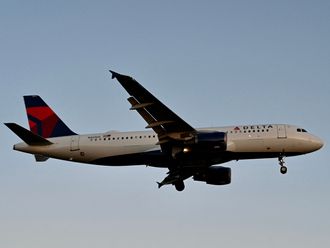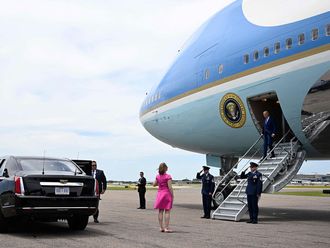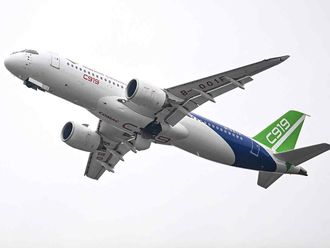Dubai: The European Union on Sunday began imposing its controversial carbon tax on airlines, which means airlines must now pay to use European airspace.
And airlines that refuse will not only be reportedly subject to fines of €100 (Dh475) per tonne of CO2 that exceeds the EU's limits, but could also be banned from operating in Europe.
The extra fee will punch a $1-billion (Dh3.67 billion) hole [on current allowance prices] in global airlines' pockets and also result in extra travel costs for Europe-bound passengers as airlines plan to pass on the extra costs to customers.
According to Brain Pearce, chief economist at global aviation body the International Air Transport Association, the costs could go up to $4 billion in the future.
"At the moment allowance prices are extremely low, but they won't remain low forever," he pointed out.
He said that one of the main problems initially is that the additional charge is affecting the airlines to different degrees.
"The European airlines are going to face those costs on all of their operations whereas airlines from the Middle East, for instance, won't. So that does mean that the competitive burden is going to be strongest on the European airlines. That is the main cause for concern," said Pearce.
Emirates, meanwhile, estimates that in 2012 it will spend more than €40 million to purchase additional emissions allowances and well over €500 million in the nine-year period to 2020.
"Over 25 per cent of Emirates' passenger and cargo operations fly to and from the EU; thus the impact on the Emirates network is significant," Emirates President Tim Clark told Gulf News in a statement. He added that Emirates "fully complied" with the EU ETS (Emissions Trading System) by submitting its emissions and tonne-kilometre monitoring plans and 2010 reports to the United Kingdom Environment Agency (Emirates' EU ETS regulator).
Scaling down
Asked if Emirates would consider scaling down its European operations in the wake of such a move, Clark said: "While we argue this programme will hurt and impact European aviation and those serving their markets, we have no plans to alter operations."
Etihad Airways, too, will end up spending an extra €310 million over the next nine years on buying carbon taxes, according to Linden Coppell, Etihad's Head of Environment, based on the carrier's forecast growth rate of traffic into Europe and the cost of carbon.
"Our hope remains that we will have a fairer and more appropriate mechanism for managing aviation emissions at the global level, led by the International Civil Aviation Organisation rather than regional schemes such as the EU ETS."
Joining airlines in opposing the EU move, Tony Tyler, IATA chief executive and Director General, said that while Europe should take credit for raising the issue of aviation and climate change on the global agenda, "what is needed now is for Europe to work with the rest of the world through ICAO to achieve a global solution. Unilateral, extra-territorial and market distorting initiatives such as the EU ETS are not the way forward." he said.
According to IATA's estimates, the air transport industry has made global commitments to improve fuel efficiency by 1.5 per cent annually to 2020, to cap net emissions from 2020 and to cut net emissions in half by 2050 (compared to 2005 levels).
According to the European Commission, aviation accounts for about 3 per cent of global carbon emissions.
And the EU has assured that the allocation of carbon emissions for the airlines will help reduce their overall effect by 5 per cent, according to published reports.
Main concerns
Further listing main concerns with the EU ETS, Clark said they are two-fold.
"One, many EU states, such as the UK, have indicated that all monies raised by the scheme will be allocated to general revenue. This is completely contrary to the intent of the EC directive, which states that ‘...revenues should be used to tackle climate change in the EU and third countries... and to fund research and development for mitigation and adaptation, including in particular in the fields of aeronautics and air transport...'," Clark said.











